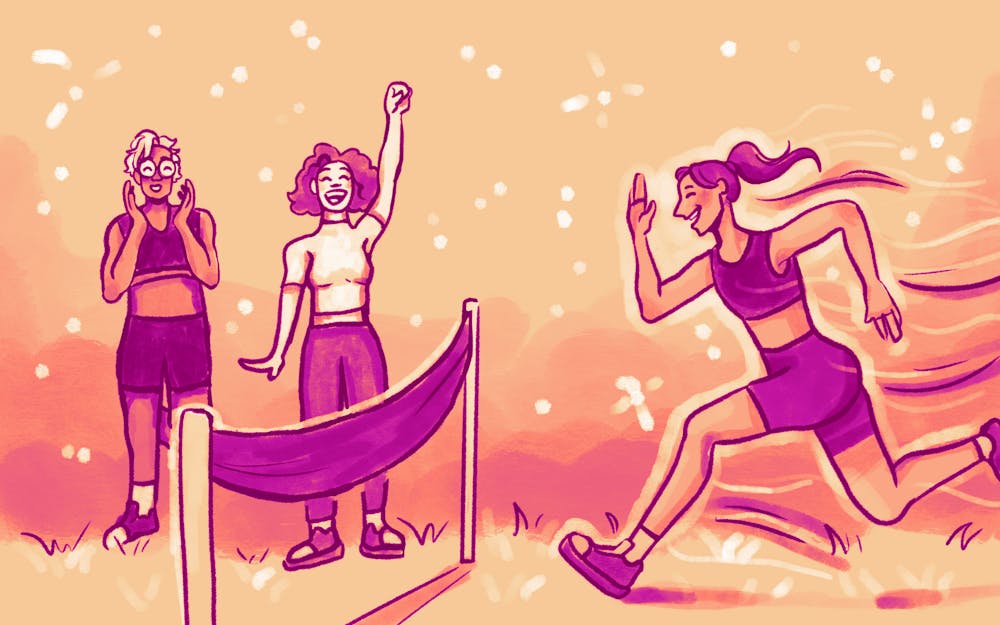Though the past few years have had no shortage of aggressive debate over the participation of transgender women in women’s sports, this summer brought a resurgence of attention to the issue. Algerian boxer Imane Khelif won a match against Angela Carini of Italy at the 2024 Paris Olympics when Carini opted to pull out of the match after just 46 seconds. Misinformation immediately spread online, with many claiming Khelif was a transgender woman who had an innate biological advantage over Carini in the competition.
Carini’s choice to quit generated attention worldwide, with former President Donald Trump, Italian Prime Minister Giorgia Meloni and Harry Potter series author J.K. Rowling sharing criticism for Khelif’s participation in the Olympics and further perpetuating the myth that Khelif is a transgender woman.
Khelif is a biological female, however rumors that she is transgender originated from an International Boxing Association (IBA) decision — for which it performed unspecified biological testing on her and other female boxers, like Taiwan’s Lin Yu-Ting, who also competed at the 2024 Olympics. The IBA used the obscured results of these tests to ban the two from IBA competition. The International Olympic Committee (IOC) does not currently recognize the IBA, due to ongoing conflicts between the organizations.
I am not here to debate over if biological males truly have physical advantages over biological females in sports. The science appears sound on the matter. However, allowing right-wing conspiracies that overinflate the issue of transgender participation in women’s sports and pit us against each other will only bring all women down in athletics.
Our rigid adherence to the idea of biological advantage that drives the argument for banning those assigned male at birth from participating in women’s categories has developed into controlling what all women are allowed to be.
Many elite and successful female athletes have certain biological traits that bring them closer to the advantages we assign to men — higher testosterone levels, bigger lungs and hearts, more height and greater muscle mass. At what point do we draw the line on governing bodies like the IBA testing women and making us prove our gender to compete? These testing procedures should cause concern for violation of our privacy and identity as women — values that are already threatened by the growing restrictions on reproductive healthcare targeted toward women.
Throw in the existence of intersex people — whose reproductive organs or other sex characteristics developed out of line with our traditional ideas of male and female — and things get really confusing. These individuals are almost all assigned a particular gender at birth at the discretion of a doctor and possibly their parents.
Intersexuality — a characteristic of 1-2% of Americans — does not cause health problems but does often initiate “correction” on the part of the medical system to categorize people into the societally accepted divides of male and female. Should we police every individual’s biology based upon societal expectations and rules that do not always match physical reality?
Further, cisgender women — who many claim they are protecting with these decisions — are not safe from transphobic and misogynistic rhetoric. Katie Ledecky and Brittney Griner, among other cisgender female athletes, have received comments, primarily on social media platforms, inquiring about the legitimacy of their womanhood or joking about their characteristics to imply they are male.
When women do not look or perform how we are expected to, people have always found issue. Whether this results in restricting our access to healthcare, banning us from participating in sports or otherwise controlling the way we can live our lives, all women should feel worried about the way society has been treating transgender women and debating their eligibility to compete in sports.
We cannot keep encouraging and empowering people who feel uncomfortable with tall, muscular women or women who otherwise do not fit their idea of what is acceptable for us to be. This way of thinking creates the atmosphere for organizations like the IBA to come up with arbitrary rules and standards for what a true woman is and violate our dignity in doing so.
Transgender women’s participation in sports can be handled with care and compassion for all women if we refuse to accept hateful and misogynistic ideas peddled by people who only want to create division and restrict women’s livelihoods.
Leila Faraday (she/her) is a junior studying policy analysis with minors in geography and urban planning.






